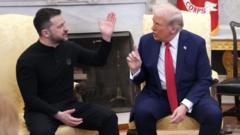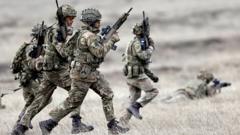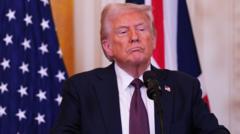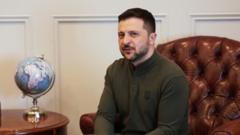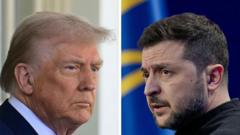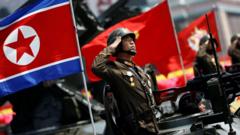The North Korean soldiers fighting in the Kursk region exhibit unique tactics and a military culture that differs significantly from their Russian counterparts, presenting challenges for Ukrainian forces in the ongoing conflict.**
North Korean Forces Tactics in the Russia-Ukraine Conflict: A Unique Combat Style**

North Korean Forces Tactics in the Russia-Ukraine Conflict: A Unique Combat Style**
North Korean troops deployed to aid Russia offer a distinct approach to warfare, challenging Ukrainian forces with unconventional strategies.**
In the ongoing conflict in Russia's Kursk region, North Korean troops deployed in support of Russian forces are exhibiting a notably distinct combat style that poses unique challenges to Ukrainian defenders. Unlike their Russian allies, who often rely on armored vehicles and the opportunity to regroup during combat, North Korean soldiers engage the enemy with an almost relentless assault.
Ukrainian soldiers and American military officials report that the North Korean forces approach battles with a different mindset. When launching an attack, they typically do not delay or take time to reassess when facing significant losses. Instead, they often advance across open terrain, pushing through under heavy enemy fire, displaying a willingness to sustain casualty rates that would typically cause other forces to retreat. Reports indicate that these soldiers frequently coordinate their movements in large waves, sometimes comprising 40 or more troops, with objectives focused on rapid strikes rather than holding gained positions.
Interestingly, the tactics rooted in North Korean military culture further differentiate their operational style. For example, when counteracting enemy drones, they execute coordinated luring maneuvers, sacrificing one soldier to distract and lure enemy fire, making it easier for others to return fire effectively. Additionally, in situations where they find themselves severely wounded, they are reportedly trained to use grenades to prevent capture, underscoring a fierce commitment to their military doctrine.
As they integrate into the broader conflict, North Korean forces operate almost autonomously within Russia, influenced by their unique training and strategic preferences. This creates a scenario where two different military cultures clash, with experts noting that the Russian military does not appear to have fully respected or adapted to the unusual tactics employed by their North Korean allies. As the conflict continues to evolve, the implications of these tactics reflect a changing landscape of warfare where traditional operations may not apply—a reality that Ukrainian forces must navigate amid ongoing challenges.
Ukrainian soldiers and American military officials report that the North Korean forces approach battles with a different mindset. When launching an attack, they typically do not delay or take time to reassess when facing significant losses. Instead, they often advance across open terrain, pushing through under heavy enemy fire, displaying a willingness to sustain casualty rates that would typically cause other forces to retreat. Reports indicate that these soldiers frequently coordinate their movements in large waves, sometimes comprising 40 or more troops, with objectives focused on rapid strikes rather than holding gained positions.
Interestingly, the tactics rooted in North Korean military culture further differentiate their operational style. For example, when counteracting enemy drones, they execute coordinated luring maneuvers, sacrificing one soldier to distract and lure enemy fire, making it easier for others to return fire effectively. Additionally, in situations where they find themselves severely wounded, they are reportedly trained to use grenades to prevent capture, underscoring a fierce commitment to their military doctrine.
As they integrate into the broader conflict, North Korean forces operate almost autonomously within Russia, influenced by their unique training and strategic preferences. This creates a scenario where two different military cultures clash, with experts noting that the Russian military does not appear to have fully respected or adapted to the unusual tactics employed by their North Korean allies. As the conflict continues to evolve, the implications of these tactics reflect a changing landscape of warfare where traditional operations may not apply—a reality that Ukrainian forces must navigate amid ongoing challenges.

